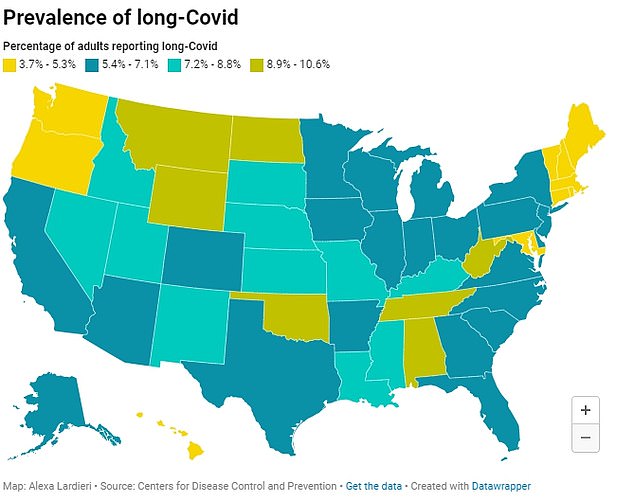- Double-jointed people were also more likely to suffer from constant fatigue.
- Long Covid has also been linked to irritable bowel syndrome and migraines
- READ MORE: Men and women suffer different Covid symptoms
<!–
<!–
<!– <!–
<!–
<!–
<!–
Can you bend your fingers back almost 90 degrees? You may be at greater risk of long Covid.
That’s according to a fascinating study from the UK which indicates that people with double joints are at a 30% increased risk of persistent Covid symptoms.
Researchers from Brighton and Sussex Medical School aren’t sure why this link exists – but people with flexible joints are generally prone to symptoms associated with long Covid, such as fatigue and bone pain.
Lead author Dr Jessica Eccles, Reader in Brain-Body Medicine at BSMS, said: “Our study shows, for the first time, that the presence of generalized joint hypermobility (double joint) is a risk factor of long Covid, and those who suffer from it. hypermobility is likely to lead to even higher levels of fatigue.

Can you bend your fingers back almost 90 degrees? Or how about touching your head with your toes? You may be at risk of contracting long Covid if this is the case…


Seven percent of Americans reported having a long-term experience with Covid, which equates to about 18 million people.
Double-jointed, or hypermobile, people are thought to be prone to broader health problems because their muscles are under constant tension and working overtime to compensate for the lack of stability, leading to more muscle fatigue. fast.
Hypermobility is estimated to affect approximately three percent of the world’s population.
Besides advanced age, long Covid has been linked to underlying health conditions, including fibromyalgia, irritable bowel syndrome, migraine, allergies, anxiety, depression and back pain.
All of these risk factors have been independently linked to joint hypermobility – where some or all of a person’s joints have an unusually wide range of motion.
The researchers wanted to know if double jointing could be a risk factor for long Covid in its own right.
They looked at 3,064 participants who had taken part in the Covid Symptoms Study Biobank, all of whom had had Covid at least once.
Participants were surveyed in August 2022 and asked if they had hypermobile joints, if they had fully recovered from their last Covid infection and if they were experiencing persistent fatigue.
Of the 914 participants who reported not having fully recovered from Covid, just under 30% of them (269) had generalized joint hypermobility.
After researchers took into account things like age, gender, and the number of Covid vaccinations received, joint hypermobility was strongly associated with the inability to fully recover from Covid.
Double joints also significantly predicted high levels of fatigue, which also appeared to be a key factor in participants’ inability to fully recover.
Because the study was observational, the researchers said no definitive conclusions could be drawn about whether joint hypermobility caused long Covid.
Other limitations were that most study participants were White and female and that the surveys were self-reported.
They also didn’t take into account other potentially influential factors, such as whether patients had pre-existing conditions, such as fibromyalgia, which itself is characterized by fatigue and brain fog.
The study was published in the journal Public Health BMJ.

